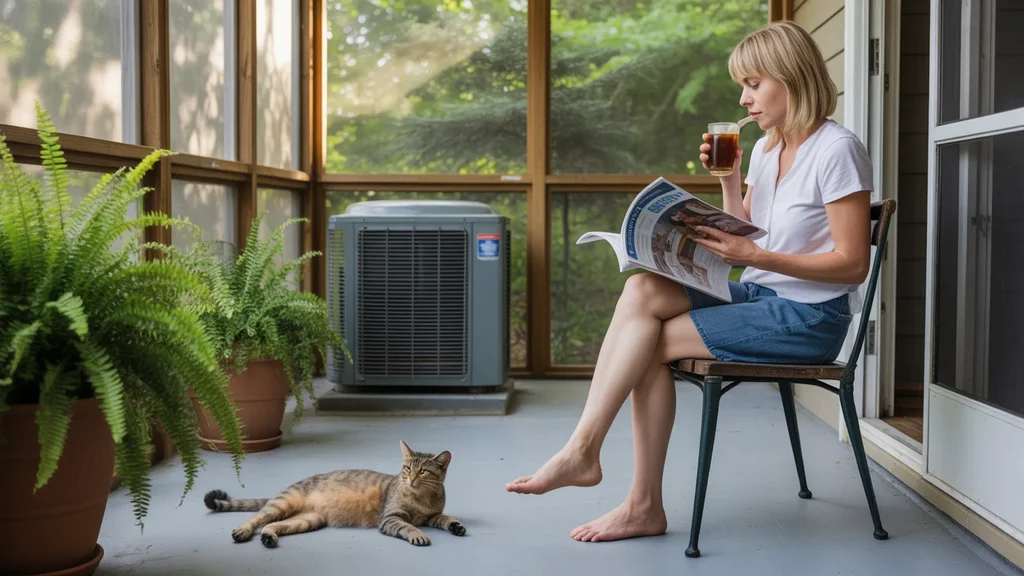What Summer Power Costs Look Like in Chapel Hill
As the mercury rises, so do summer energy bills in Chapel Hill. Residents often see their highest electric costs of the year in June, July, and August. While spring bills tend to average around $120 per month, that figure can easily double during the dog days of summer.
The average July electric bill in Chapel Hill is about $220, based on data from local utilities. Bills typically peak in August before tapering off in September. All in all, budget an extra $200-300 for electricity over the summer compared to the milder seasons.
Why Are Energy Bills So High in Chapel Hill During the Summer?

The main culprit behind steep summer bills is air conditioning. With daytime highs regularly topping 90°F, most Chapel Hill homes rely heavily on A/C to stay comfortable. Older houses with dated HVAC systems and poor insulation are hit especially hard.
Longer daylight hours also play a role, keeping lights and appliances on later into the evening. Throw in greater use of pool pumps, irrigation systems, and EV charging during the summer months, and those kilowatt-hours can really add up.
Sample Monthly Bill Breakdown
So where exactly is all that electricity going? Here’s a typical breakdown for a 1,800 sq ft home in Chapel Hill with average A/C use during July:
| Component | % of Bill |
|---|---|
| Cooling | 55% |
| Water Heating | 15% |
| Appliances | 12% |
| Lighting | 10% |
| Other | 8% |
Expect cooling to account for 50–60% of your July energy bill in Chapel Hill. That’s 5-6X more than what the A/C pulls in spring or fall. To put it another way, every degree you lower the thermostat costs an extra 3-4% on your bill during the hottest months.
Ways to Lower Summer Energy Bills
Fortunately, there are several ways Chapel Hill residents can keep summer bills in check:
- Take advantage of off-peak billing hours to run major appliances
- Install a smart thermostat to optimize your A/C schedule
- Have your ducts professionally sealed to improve HVAC efficiency
- Plant shade trees or add awnings to block direct sunlight
🏆 Energy Tip: Set your thermostat to 78°F during the day and use ceiling fans for added comfort. Every degree above 75°F saves 3-5% on cooling costs.
Time-of-Use Pricing in Chapel Hill
Some Chapel Hill utility providers like Duke Energy offer optional Time-of-Use (TOU) rate plans. Under TOU billing, electricity prices vary based on the time of day and day of the week. Rates are highest during weekday afternoons and evenings, while overnights and weekends are cheapest.
Switching to a TOU plan and shifting more of your usage to off-peak hours can significantly cut summer bills. Just be aware that on-peak rates are even steeper, so TOU isn’t for everyone. Compare pricing and your family’s habits to see if it might be a fit.
Summer Cooling FAQs
Q: How much more are summer electric bills vs. spring in Chapel Hill?
A: Summer bills are typically 70-100% higher than in spring, primarily due to A/C use. The average July bill is around $220 compared to $120 in April.
Q: Does solar help reduce summer energy costs?
A: Yes, a appropriately-sized solar PV system can offset a large portion of summer bills. With net metering, excess energy is sold back to the grid for credits. Just keep in mind that solar output peaks midday while energy use spikes in the evening.
Q: What’s the ideal thermostat temp for summer energy savings?
A: Aim to keep your home around 78°F when occupied and 85°F when away. You can save 3-5% per degree above 75°F. Also consider setting the thermostat a bit higher and using fans, which cost far less to run than the A/C.
Smart Cooling Prep for Chapel Hill Summers
With a little planning, it’s possible to keep your cool without breaking the bank. Expect to budget around $600-800 total for electricity in June, July and August in a typical Chapel Hill home. Utilize off-peak hours, keep the thermostat at 78°F or higher, and consider efficiency upgrades like a smart thermostat, insulation, or solar panels for long-term savings.
For a deeper dive into where your money goes, check out our Chapel Hill Utility Costs Explained article. And remember, small changes to your daily habits can add up to serious savings over the course of the summer.
